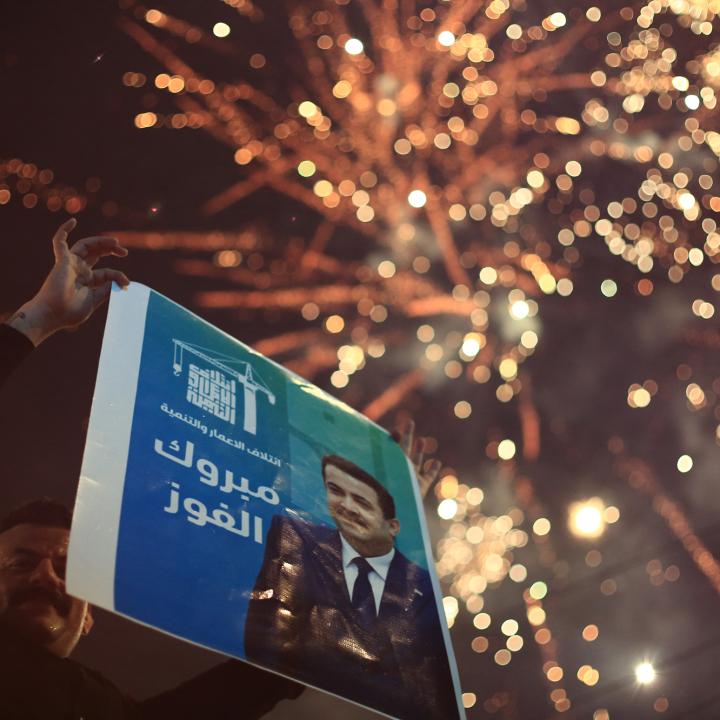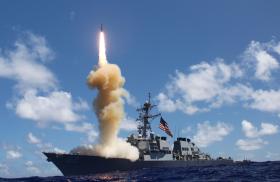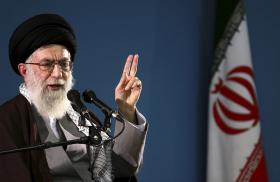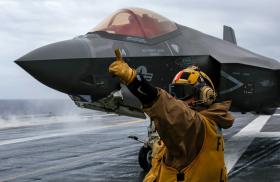
- Policy Analysis
- PolicyWatch 4138
Iraq’s Election: Outcomes and Next Steps

Sudani did very well at the ballot box, but the peculiarities of Iraq’s long government formation process and the final distribution of parliamentary seats may leave the main Iran-backed coalition in the driver’s seat.
At first blush, the results of Iraq’s November 11 parliamentary election were encouraging, including for U.S. relations. Despite a boycott by Muqtada al-Sadr’s influential movement, participation rose to 55%, up 12 points from 2021’s low of 43%. Still, the faction that came in first—the Reconstruction and Development Coalition led by incumbent Prime Minister Mohammed Shia al-Sudani—received only 15% of the seats in parliament (46 out of 329). As such, Iraq will likely experience a long, tedious period of political wrangling before a new government is seated, similar to previous post-election delays (eight months in 2010, eleven months in 2021–22).
Outcomes
Last week’s big winner was Sudani, whose coalition secured 1.3 million votes out of nearly 11 million cast, besting the Iran-aligned State of Law Alliance by 370,000. Sudani’s strategy differed dramatically from 2021, when his ticket won only two seats but he was eventually elevated to prime minister anyway with the backing of the pro-Iran Coordination Framework (CF), a bloc led by Shia militias that the United States has designated as terrorist organizations. This year, however, Sudani campaigned on his domestic accomplishments, without apparent support from Tehran or its proxies.
Among the other major contenders, the Sunni Arab Taqaddum (Progress Party) finished second with 28 seats, the Kurdistan Democratic Party (KDP) garnered 26 seats, and its main rival, the Patriotic Union of Kurdistan (PUK), won 15. Among the overtly pro-Iran parties, State of Law won 27 seats, as did al-Sadiqoun, run by the U.S.-designated terrorist organization Asaib Ahl al-Haq. Both parties are members of the CF, along with the Badr Organization, the National State Forces Alliance, and other smaller factions. Notwithstanding Sudani’s success, this Iran-friendly bloc controls a plurality of seats in parliament—nearly enough to form a government.
Why Sudani Performed So Well Despite Criticisms
When Sudani’s first term commenced, many long-frustrated Iraqis believed he would be beholden to his coalition’s Iranian patrons and deliver little to the people. Yet his performance since then appears to have resonated domestically, in particular with Sunni Arab voters, who turned out in droves on election day. This, coupled with the reportedly anemic Shia turnout, seems to have helped him at the polls.
In pre-election polling, 58% of Sunni and Shia Arabs expressed confidence in Sudani, the highest for any candidate. (Sadr, the mercurial Shia cleric, clocked in at 62% but chose not to run.) Sunni Arabs also gave Sudani’s government relatively high marks on service provision. Yet his most visible accomplishment was building infrastructure in Baghdad. According to polls, his government was most associated with the construction of “roads and buildings,” while the Economist recently referred to the capital as a “boomtown.”
Iraq improved its regional position under Sudani as well. After pledging to work with Ankara on ousting elements of the anti-Turkish terrorist group the Kurdistan Workers Party (PKK), Baghdad reopened a long-dormant oil pipeline from the Kurdistan Region to Turkey and signed an unprecedented water cooperation agreement with Ankara. Sudani also promoted energy independence from Iran and improved his country’s relationships with Arab neighbors and Washington alike, including by attending last month’s Gaza ceasefire ceremony in Sharm al-Sheikh, Egypt.
Still, the prime minister’s critics note that he did little to stem endemic corruption, instead reinforcing the sectarian muhasasa system of divvying up political and economic spoils based on religion rather than merit. Worse, his government legalized and contracted with the militia-run Muhandis General Company, granting its U.S.-designated overseers some $3.6 billion annually. Meanwhile, to pay for the boom in Baghdad, he reportedly slashed funding to other localities dramatically, while his preferred method of lowering persistently high unemployment involved hiring nearly a million new government employees, thereby busting the budget. Critics also excoriated him for the passage of legislation lowering the legal marriage age to nine.
Promoting Calm
When Sudani assumed power in 2022, and particularly after the Gaza war erupted in 2023, Shia terrorist militias in the Popular Mobilization Forces were routinely launching drones into Israel and targeting U.S. military and diplomatic personnel in Iraq and Syria. Under pressure from Washington and direct threats from Israel, Sudani cajoled the PMF into eventually ending these attacks, thus keeping Iraq out of the war between Iran’s “axis of resistance” and Israel.
Moreover, to the annoyance of his CF partners, Sudani opposed local demands to expel U.S. forces, opting instead for a more gradual redeployment and an open-ended residual American troop presence. The judiciary also canceled the arrest warrant that an Iraqi court had issued against President Trump after his first administration ordered the January 2020 targeted killing of Iran’s Islamic Revolutionary Guard Corps leader Qasem Soleimani in Baghdad. In addition, Sudani ultimately refused to sign a new PMF Law that would have formally institutionalized the already deeply embedded militias.
These steps generated goodwill in Washington, improved the security situation, and stabilized Iraq. Buoyed by this improving environment, more American companies began investing there—including ExxonMobil, Chevron, and KBR, which had long abstained from bidding on Iraqi projects but signed big energy deals with Baghdad in 2025.
Next Steps: The Process vs. The Reality
During Iraq’s long-problematic government formation process, the old government remains in a caretaker role but with substantially diminished power. This dysfunctional transition—which as noted previously can last as long as a year—is partly an inherent byproduct of multiparty parliamentary systems that tend to require coalition governments (e.g., in Israel, Germany, and France). Yet the problem also stems from specific Iraqi constitutional provisions and the manner in which the country’s politicians approach governance.
The formal process seems straightforward at first glance. Once election results are certified, the president calls on the newly elected parliament to convene within fifteen days. During its first session, the legislature must elect a speaker and two deputy speakers by majority vote. Parliament can then select a new president (by a two-thirds vote) or extend the incumbent’s tenure.
What follows is the most crucial step in the process: within fifteen days of being selected, the new president must authorize the bloc that holds the most seats in the new parliament to form a cabinet led by its chosen nominee for prime minister. Presumably, this year’s nominee will be Sudani, though machinations by other parties have knocked out the clear frontrunner in the past.
The nominee then has thirty days to prepare a slate of prospective cabinet members and submit it to parliament for a majority vote of confidence. If the vote fails, the president must select another nominee to attempt the same process.
Yet various informal peculiarities of Iraq’s post-2005 political environment have complicated this process. First, similar to Lebanon’s political situation, but unwritten rather than codified into law, Iraq tends to allocate different leadership positions to different sects: speaker of parliament generally goes to the Sunni Arabs, president to the Kurds, and prime minister to the Shia majority. Second, rather than using the typical system of a majoritarian government and a formal opposition, Iraqi politicians have opted for an inclusive system in which most every party gets a slice of the pie.
Moreover, while the Kurds and, to a lesser extent, the Sunni Arabs typically select their respective presidential and speaker candidates in advance, the Shia tend to split into factions with competing candidates for prime minister. No single Shia candidate has enough seats to win a vote of confidence alone, so they wind up courting Sunni Arab and Kurdish votes.
As a result, Iraq’s government formation process essentially becomes a game of “nothing’s decided until everything is,” including for the numerous ministerial slots. Parties hold off on even starting the step-by-step constitutional procedure described above until the laborious prefatory horse trading is complete, which can take months. This approach egregiously violates the constitutional guidelines and was challenged successfully in court in 2010, yet it seems to return each election cycle, adding unnecessary complexity and even illegality to an already complex process.
Conclusion
Despite his impressive electoral performance, Sudani will likely have great difficulty building a sufficient coalition to secure a second term. After supporting him in 2021, the Iran-backed CF bloc has buyer’s remorse and will not endorse his return—a major obstacle given the large portion of the new parliament they control, including the nearly 10% of seats occupied by U.S.-designated terrorist organizations.
Relatively speaking, the past three years were good ones for Iraq and its relationship with the United States. Although Sudani was often solicitous of his Iran-backed coalition partners, he also sought to balance some of their most problematic behavior and improve ties with Washington. Regrettably, if the CF asserts its will in the government formation process and tilts Baghdad back toward Tehran, relations could revert to the bad old days of the first Trump administration, when Iraq was a literal battleground between Iran and the United States, and American companies wanted little to do with the country.
James Jeffrey is the Philip Solondz Distinguished Fellow at The Washington Institute and former U.S. ambassador to Iraq and Turkey. David Schenker is the Institute’s Taube Senior Fellow, director of its Rubin Program on Arab Politics, and former assistant secretary of state for Near Eastern affairs.




